What Are the Stages of Cataracts?
Cataracts are a natural result of aging. In fact, nearly 20 percent of adults over age 40 already have some form of cataract in one or both eyes, according to data from the Centers for Disease Control and Prevention (CDC). What are the stages of cataracts? Let’s learn more about them.
What are the stages of cataracts?
 Cataracts can be early or late stage. Early stage cataracts are small and do not impact vision. In fact, most people don’t even know they have a cataract. There are generally no symptoms in the early stage, which is why it is very important to get annual eye exams from our expert team at Elmquist Eye Group. The earlier we diagnose a cataract, the better off you will be, as we can monitor the progression. Later stage cataracts can significantly impair vision.
Cataracts can be early or late stage. Early stage cataracts are small and do not impact vision. In fact, most people don’t even know they have a cataract. There are generally no symptoms in the early stage, which is why it is very important to get annual eye exams from our expert team at Elmquist Eye Group. The earlier we diagnose a cataract, the better off you will be, as we can monitor the progression. Later stage cataracts can significantly impair vision.
In the early stages, you might begin to have blurred or cloudy vision or even double vision. Most people first notice vision problems at night. They have poor night vision and may see a glare or halo around lights and headlights while driving. During the day, you may have a higher than normal sensitivity to sunlight and things may appear to have a yellowish tint. Colors may also appear dull. During this phase, frequent changes to your eye care prescription for your glasses or contact lenses may do the trick.
During late stage cataracts, the cataract is visibly noticeable and appears as a milky white spot on the lens, thus creating significant vision impairment. Sometimes the entire lens is clouded, and patients have significant difficulty driving, reading or watching television. At the late stage, surgery is the only real option for effective treatment of the cataract.
Cataracts are influenced by genetics, lifestyle choices and environmental factors, but in general cataracts progress very slowly. Cataracts can result from eye injury or illness, or from excessive exposure to radiation; in these cases, cataracts may develop more quickly. While cataracts can begin forming in the 40s or 50s, they generally don’t become a big concern until age 60 or later.
Cataract Surgery
Cataract surgery is one of the most common surgeries performed today. The surgery is a very safe and effective way to restore your vision. Surgeons replace the clouded natural lens with an intraocular lens (IOL) implant.
Our expert Elmquist surgeons perform cataract surgery at any stage. Even better, our team of eye care specialists can be your personal eye care team and check for cataracts and other eye issues like glaucoma or age-related macular degeneration during your regular annual eye exam visits.
Just remember that untreated cataracts can create further vision problems and can even eventually lead to total blindness. In fact, untreated cataracts are the leading cause of vision loss and blindness in the world today. Don’t lose your precious eyesight. Understanding the early and late stage signs and symptoms is crucial to getting the proper treatment.
If you’ve been wondering what the stages of cataracts are, now you know! If you’ve been experiencing any vision changes or symptoms, give us a call today at Elmquist Eye Group and we will see if cataracts are creating your issues. We have convenient locations in Fort Myers and Cape Coral, and we have been serving Southwest Florida for nearly 25 years. Come in and see us today.
